The Turkish Pivot
A story of collusion, betrayal, redemption, and reassertion.
- On 24th November 2015, the Turkish air force shot down a Russian Su-24 over the Turkish-Syrian border, in what the world would have considered the boldest act commited by any side in the entire conflict – only ISIS’ decision to actually hold ground and somewhat rule over their conquered territory; and that long train of oil trucks entering Turkey from ISIS territories in “plain sight”, had been bolder.
NOVEMBER 2015, SYRIA
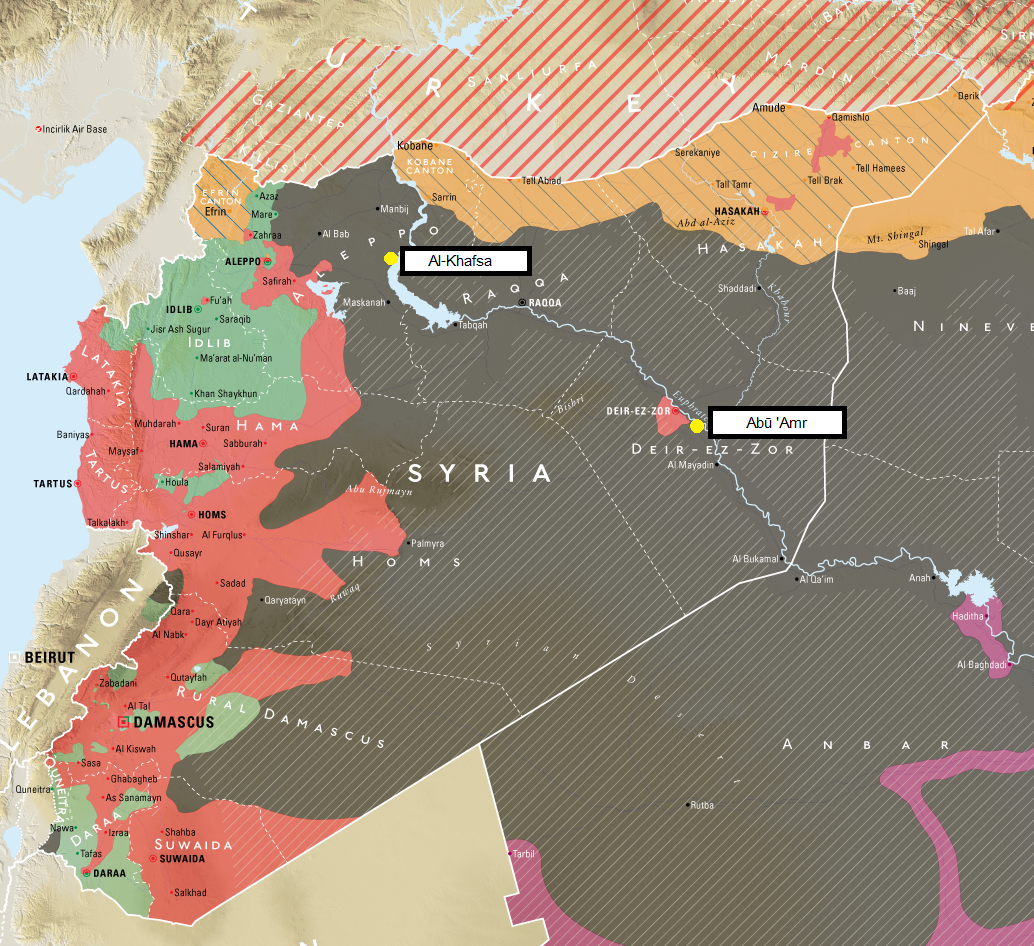
Syria, 30th November 2015.
ISIS was still holding on to vast amount of territory.
It was the height of the Syrian crisis. The Syrian government’s was holding onto multiple fronts by thin threads while fending off the Syrian Free Army, ISIS, Al Nusra (Al Qaeda) and all the various factions in between. Russia had just deployed their military to Syria over 3 months after an official request from Syrian President Bashar al-Assad for Russian military support in July 2015. By October 2015, Russia launched its first series of air strikes.
The intensive Russian close air support and air strikes made an instant impact on the battlefield, giving the Syrian government forces chance to regroup and take the fight back against their adversaries. This new development was not welcomed in Washington, as Obama’s primary objective was to take down the Syrian President. USA armed the Syrian rebel factions, and had no qualms with their weapons falling in extremists groups hands, or even ISIS.
In reality, US’ strategy of making use of the Syrian rebels and extremist groups, to stretch the Syrian government forces and take down Assad had largely been successful. USA had also been incredibly lenient on ISIS with their air strikes, despite hitting ISIS for more than a year, ISIS continue to operate and hold ground with ease. Allegations that USA were actually behind the creation of ISIS and how they had been avoiding ISIS targets, continue till this day. And at the very front of the USA’s grand plan on the ground, was Turkey – their NATO colleague and partner in crime.
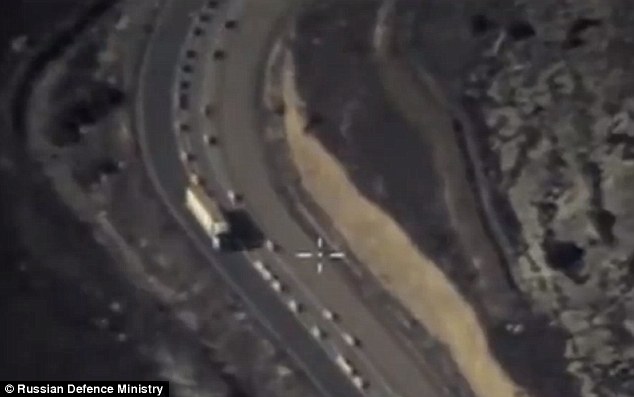
Russian evidence of Turkey’s illicit oil trade with ISIS
TURKEY IS KEY
Turkey played an extremely important role in USA’s shady plans to take out Assad and perhaps, siphoning all the oil in the eastern and northern Syria. Turkey had been the point of entry for foreign fighters into Syria. Rebels fighters are known to pass through Turkey-Syria border without any difficulty (read more about it here: https://www.theguardian.com/world/2015/mar/12/wire-smugglers-people-islamic-state-isis-turkey-syria-border). They allegedly acted as the “hospital” for injured fighters (including ISIS fighters – read: https://www.rt.com/news/238713-isis-commander-turkey-hospital/ & https://www.express.co.uk/news/world/670764/Islamic-State-terrorists-shipped-Turkey-treatment) as well as the main “market” for ISIS to sell their oil to. Turkey also provided Incirlik air base to be used as the main staging area for Coalition air strikes. If ISIS or any rebel group’s funding, reinforcements, injury treatments – all had to go through Turkey (since they can’t possibly be going through Iraq, Kurdistan, or Jordan) + in addition to being the base of operations for the coalition airforce, we can absolutely see how Turkey IS the key to the success of USA’s plans.
THE TURKISH DILEMMA
And for Turkey, they are caught in between many difficult decisions. Turkey had been aspiring to join the European Union for as long time. A “European or Western Dream” that had been in limbo for as long as they had tried (read more: http://www.telegraph.co.uk/news/worldnews/europe/6223612/Will-Turkeys-EU-membership-dream-come-true.html), and despite all the failures, Turkey had not given up hope and had been continuing their negotiations for even the tiniest step forward.
Turkey in their hopes to be taken more seriously by their partners and the USA, and seen them bending over backwards, despite them contributing above and beyond any of the others who are in cahoot with the United States. Being part of NATO since 1952, Turkey is the biggest military in NATO, with exception of the United States. Turkey was instrumental in the encirclement of the Soviet Union and continues to be the first line of defense against anything to arise from the volatile Arabian deserts. The West however seemed to be more interested in the usefulness of Turkey, rather than seeing them as family. Despite Erdogan’s increasingly critical statements on the European Union and USA, in action, Turkey continues to accommodate, mindful of the dreadful consequences of losing what little they have, in being part of the “gang”.
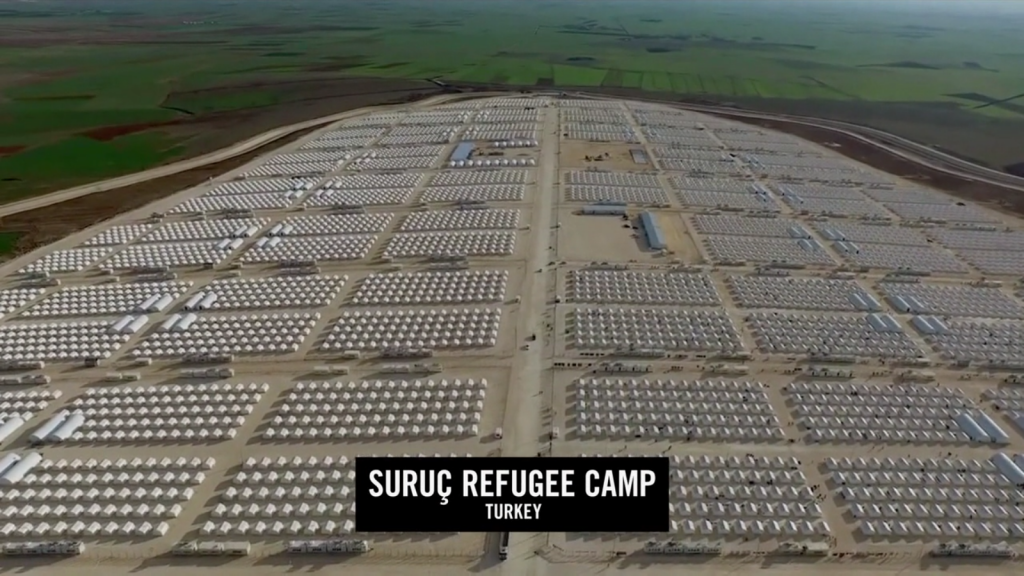
Suruc Refugee Camp in Turkey
And in the Syrian conflict, Turkey was asked to be on the “frontline” of the great “deception”. Turkey had to risk it all, just to do what is asked of them: grooming dangerous extremist armies, trading oil with ISIS despite it is “illegal”, allowing freedom of movements for armed fighters through their border with Syria, and risk international condemnation if they are found out, allowing Kurds to be armed by the Americans and trained into a effective fighting force, running the risk of a Kurdish independent movement in the region, risking the lives of their own citizens and soldiers, and not to mention, to be flooded with millions and millions of refugees which they would have to foot the bill for and deal with its complicated effort to ensure they do not threaten the stability of their own state. The question is, did Turkey had a choice in all these?
THE BREAKING POINT
United States is getting increasing concerned with the turn of events in Syria, following Russia’s intervention into Syria. The US backed forces and ISIS are struck down hard, with the intensity that was only known capable to be unleashed by United States. As losses mounting, and the reluctance to get their “little” plan turning into major armed conflict with the Russians, United States struggled to find an effective solution to prevent the collapse of the forces they want to keep around and to discourage Russia from interfering.
In northern Syria, Turkish backed Turkmens forces are battling the Syrian Government forces. Russian jets, as usual, are providing close air support and precision air strikes on the Turkmen rebels. For some reasons, an ambushed was set up for the 2 Russian bombers to be engaged. Turkish F-16s gave 10 warnings over 5 minutes to the pair of Russian Su-24 that was allegedly flying towards the Turkish border, and felt that it is appropriate to shoot it down. Moreover, given the understanding that Russians jets are now flying in Syria and that ISIS have no air force, there is no reasons for Turkey to make such a move (especially one that is so “prepared”)
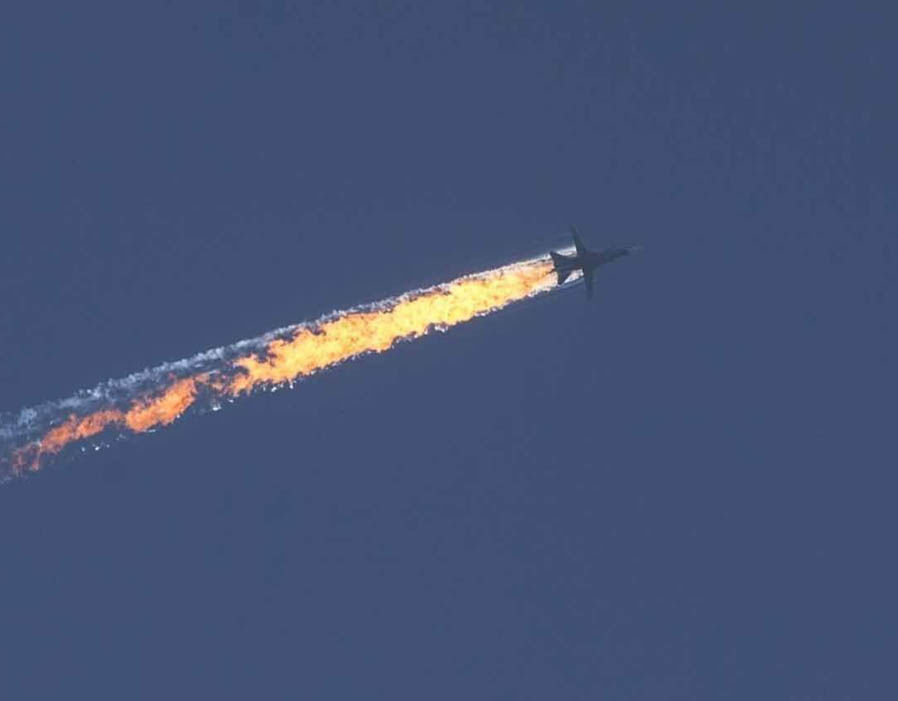
Russian Su-24 fighter jet shot down over the Turkish-Syrian border.
Source: Express.co.uk
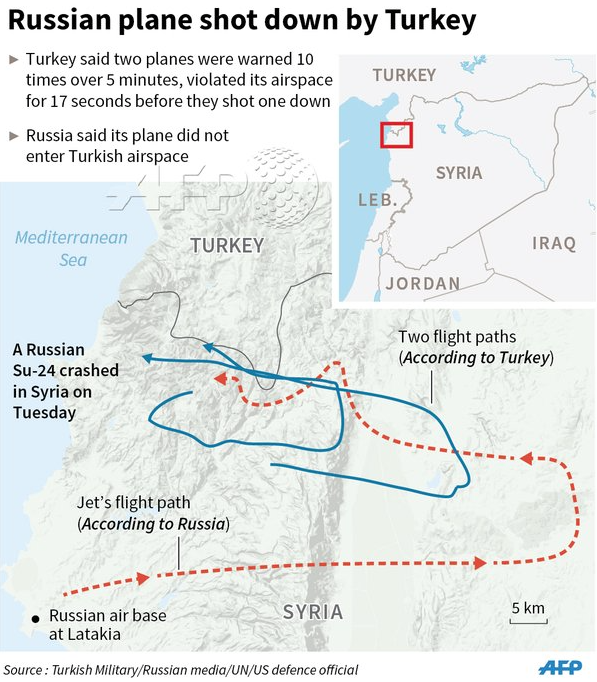
UNLESS, that Turkey might have been emboldened by United States, perhaps given some guarantees or promises to Turkey that gave them that nudge to do something so drastic. We may never know what would that deal be, or if it even ever happened – but the if there are some promises made… that would explain a lot of Turkey’s actions.
THE BETRAYAL
Instantly, Turkey’s relations with Russia drops to rock bottom, with everyone anticipating vengeance from Russia, and escalating the Syrian conflict into a regional war. But that did not happen. Russia going to war with Turkey, would be the exact thing NATO / the West is waiting for, to point fingers and exclaimed that they were always right about Russia’s aggression, and would trigger their obligation to go to war in protection of Turkey (which, in my opinion, they will actually go against their obligation and let Turkey fight Russia along, taking out both troublesome actors off the geopolitical stage).

“Those who violated our airspace are the ones who need to apologise,” Erdogan was quoted as saying on the CNN website.
Photo by REUTERS/Umit Bektas
Turkey whom were towing the line, led by the USA, was suddenly stranded in no man’s land right after the shooting down. Russia immediately ramp up their military action in Syria on top of their economic sanctions on Turkey, first by sending in Russian attack helicopters, then a Kilo-class submarine took out targets in Raqqa from the Mediterranean Sea, then a 300 sortie over 3 days against over 600 targets by their Tu-22M3 strategic bombers, as well as instituting Air to Air fighter escorts for every air strike mission. By Jan 2016 (everything mentioned in the previous sentence was for Dec 2015 only), battlecruiser Varyag arrived in the theatre. The entire show of force and their capability shock even the United States. Turkey was all alone, to face the angry bear. Erdogan instinctively realised, after all his fiery speeches about how it is their right to shoot down the infringing jet, that none of his criminal in crime was backing him up.
By June 2016, Turkey conceded that they had bitten more than they could chew, expressed regret and apologised to Russia in a phone call between Erdogan and Putin. On 15 July 2016, the coup d’état attempt was made by a faction within the Turkish Armed Forces. The coup failed spectacularly and the Erdogan’s fingers were pointed at United States & the Gülen movement, whose leader USA is unwilling to extradite despite of their extradition treaty.
And from this moment on, Turkey had firmly pivoted from the West to Russia.
THE PIVOT
Turkey was definitely still not trusted by Russia at this point in July 2016, as their relations were still at all time low. It was up to Turkey to regain Russia’s trust in them. In August 2016 (the coup happened just a month before), the two countries started the process of normalisation of ties. In 28 Dec 2016, Turkey and Russia have completed their agreement on a ceasefire in Syria. On 1st of January 2017, Turkish warplanes conducted joint airstrikes against ISIS with Russian jets.
The very airforce that shot down the Russia bomber, is now flying alongside them. Such quick turn of event, from willingness to risk war to shoot down the Russia jet, to flying together with them on a common mission in the space of a year – is abnormally fast. By June 2017, Russia had lifted most of the sanctions that was imposed on Turkey since the downing of the jet. The only way to explain such quick reverse in relations and trust, is that Russia recognised Turkey was simply acting beyond their control; that Turkey had no choice but to act in accordance to what was requested/ordered to them – and that Turkey had come round, punished, and with the support of Russia, willing to amend their mistakes and conduct their affairs, independent of Western influence.
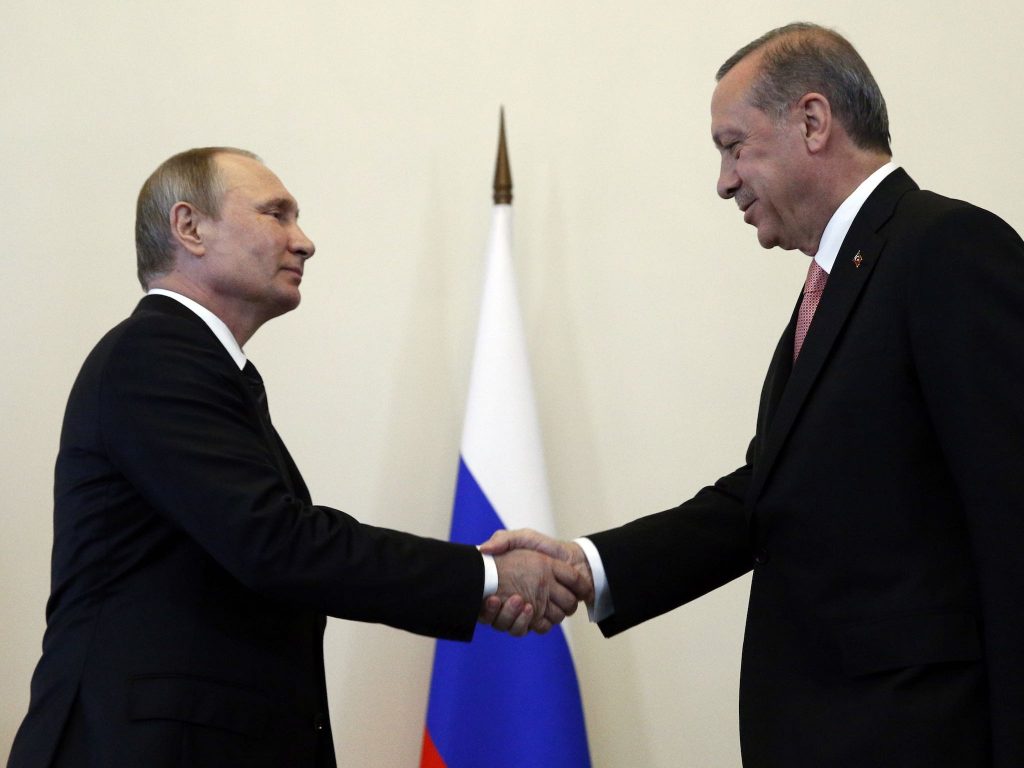
Mr Putin, left, met Mr Erdogan in the Konstantin palace outside St Petersburg Alexander, he first face-to-face contact between the pair since ties between the nations were shattered after a Russian fighter jet was downed by Turkey’s air force November 2016.
Zemlianichenko/AP
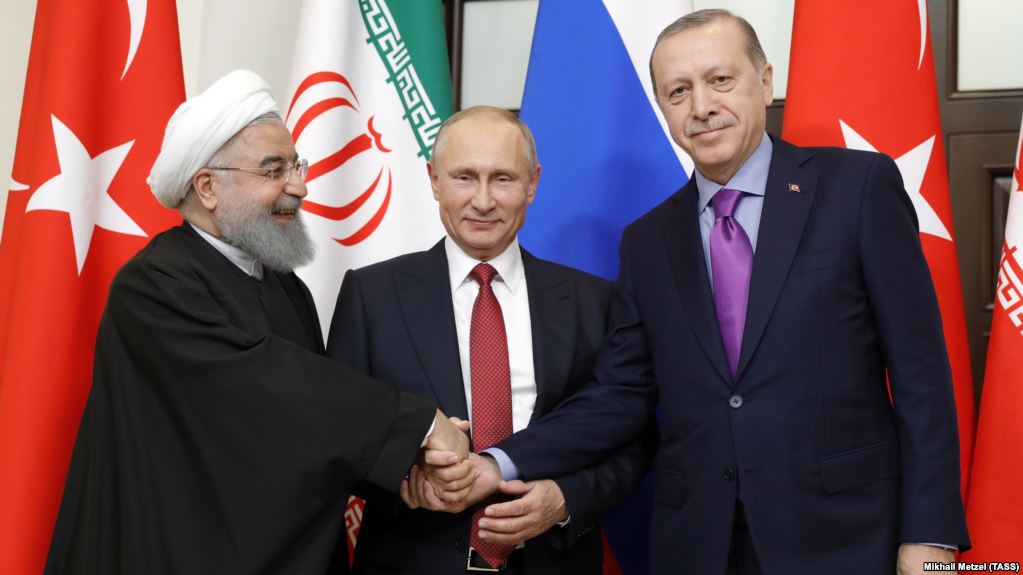
Iranian President Hassan Rohani with Russian President Vladimir Putin and Turkish President Recep Tayyip Erdogan at talks on Syria in Sochi in November 2017
Turkey had also appears to had more or less dropped out of the US-led coalition operations, while started acting on their own or in tandem with the Russian-led side. Turkey was also going against the West and United States by continuing to negotiate further into the Russian-led peace process settlement with US’ nemesis, Iran. And by end of 2017, Russia had signed a 2.5 billion dollars deal with Turkey to supply Turkey with the feared S-400 system – the same system that Russia had used to great effect to protect their assets and largely avoided as much as possible by US-led Coalition aircrafts. This non-NATO system is a clear sign that Turkey is preparing themselves for a pivot away from NATO and West, as well as to guard against any possible threat from the same countries they are pivoting away from.
This purchase of S-400 unnerved NATO member countries, as a divergent from NATO weapon systems is a clear sign of distrust. Ties with the EU were also strained, as Turkey refused German parliamentarians from visiting German troops stationed at Incirlik air base since June 2016 (the German military withdrew their forces from Incirlik airbase and completed their relocation to Jordan by end of Sept 2017) and criticism of Erdogan by EU leaders continues unabated, causing any talks about Turkey’s accession into European Union to grind to a halt.
TODAY
Turkey continue to operate without United States influence, as Turkey continues to military operations within Syria and had launched Operation Olive Branch, targeting US backed Kurdish-majority forces, with the reluctant blessing of the Russians.

